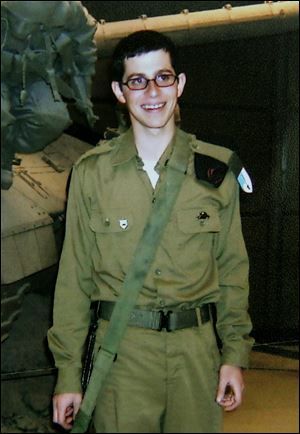
Prisoner swap set for Israel, Hamas
1,027 Palestinians, 1 Israeli to be exchanged
10/18/2011
Sergeant Schalit — age 19 at the time of his capture, and 25 now — has been held a few miles from Israel’s border. He is to be freed today.
JERUSALEM — The elaborate machinery of a prisoner swap deal between two bitter enemies swung into motion Monday, as hundreds of Palestinians and one Israeli soldier prepared to return home in one of the most dramatic recent developments in the otherwise deadlocked Israel-Palestinian conflict.
The Israel-Hamas deal, to take place early this morning, was moving ahead despite criticism and court appeals in Israel against the release of 1,027 Palestinians for a single captured Armored Corps sergeant, Gilad Schalit, held by militants in Gaza since 2006.
The exchange, negotiated through mediators because Israel and Hamas will not talk directly to each other, involves a delicate series of staged releases, each one triggering the next.
When it is over, Sergeant Schalit — age 19 at the time of his capture, and 25 now — will be free, ending what for Israel has been a prolonged and painful saga.
Israel agreed to the lopsided prisoner exchange that Hamas officials have openly said will encourage them to capture more soldiers, and which will free Palestinians convicted of some of the deadliest attacks against Israeli civilians in recent memory.
Monday night, the cactus-lined highway that leads to Rafah Crossing, the international gateway between Gaza and Egypt, was draped in green bunting and flags as Hamas stamped its Islamist mark across the scene of the prisoner exchange.
Along the length of Salahuddin Street, the main north-south road that runs the length of the Gaza Strip, Hamas activists scaled ladders to attach Islamist banners to streetlights.
Both Israel and the divided Palestinian leadership — Fatah runs the West Bank while Hamas controls the Gaza Strip — were making elaborate preparations for the handover.
Rafah is not just where the Schalit saga was to end, barring a last-minute change, but it was also where it began. In June, 2006, Hamas and two other militant factions mounted a surprise raid on an Israeli military post at Kerem Shalom, after having dug a long tunnel beneath the Rafah sands under the border, capturing Sergeant Schalit. He has not been seen in public since.
If all goes as planned, he will be the first captured Israeli soldier to be returned home alive in 26 years.
Numerically uneven swaps for captured or dead Israeli soldiers held by Arab groups have taken place a number of times since the 1980s. The last one, in 2008, saw the release of five militants in return for the bodies of two Israeli soldiers held by the Lebanese group Hezbollah.
When Tuesday’s exchange is complete, 477 Palestinians held in Israeli jails will have been released, several of them after decades behind bars. Another 550 are set to be released in two months.
Palestinians slated to be part of the initial part of the exchange were moved from their original prisons to other Israeli penal installations in preparation for their release. The very first group, 27 women, are to walk free sometime after dawn Tuesday.
After that, Hamas is supposed to move Sergeant Schalit from Gaza through the Rafah border terminal into Egypt, where he will be met by Israeli medical personnel, according to Israeli defense officials.
Once the soldier is in Egypt, the officials said, the rest of the prisoners will be released under the terms of the exchange agreement. About 100 will be sent to the West Bank, and roughly 30 are to be deported to Jordan, Turkey, Qatar, and Syria, which agreed to take prisoners who Israel insisted not be allowed to return home, according to Hamas officials. The rest will be freed in Gaza.
Sergeant Schalit will be taken to an Israeli military base along the Egypt border, where he will be issued a new military uniform and given another medical examination, according to the Israeli military. Although he appeared healthy the last time he was seen — in a brief and scripted 2009 video released by Hamas — he was denied all visits, including by the Red Cross, and the state of his health is unclear.
Sergeant Schalit will then be flown by helicopter to an air force base in central Israel, where he will meet his parents, as well as Israeli Prime Minister Benjamin Netanyahu and other officials.
From there, he will be flown to his family’s home in northern Israel. Reporters and onlookers will be barred from his neighborhood to give the family privacy.
The swap drew an emotional response in Israel.
Among those being released are militants involved in planning and executing suicide bombings in restaurants and on buses during the second Palestinian uprising, which began in 2000.
The planned celebrations for their release were to be attended both by officials from Hamas and from the Palestinian Authority, the Western-backed government that wields partial control in the West Bank.
Among Palestinians, the exchange appeared likely to strengthen Hamas, which is dedicated to Israel’s destruction, at the expense of the rival Fatah movement, which dominates the Palestinian Authority and says it wants to peacefully create a Palestinian state alongside Israel.
In Israel, pressure for a deal was intense. Thanks in part to a vocal campaign by his parents, Sergeant Schalit had become a symbol of solidarity in a country where military service is mandatory for Jewish citizens.
But relatives of victims of Palestinian attacks filed court appeals aimed at stopping the deal.